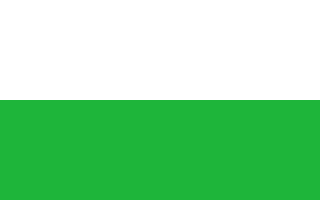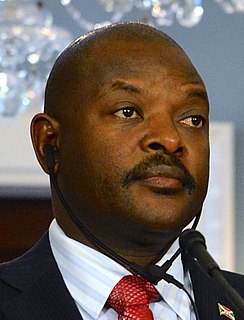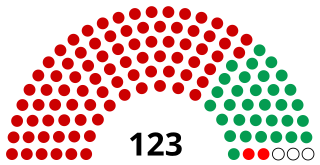
Politics of Burundi takes place in a framework of a transitional presidential representative democratic republic, whereby the President of Burundi is both head of state and head of government, and of a multi-party system. Executive power is exercised by the government. Legislative power is vested in both the government and the two chambers of parliament, the Senate and the National Assembly.

Burundi is one of the few countries in Africa to be a direct territorial continuation of a pre-colonial era African state.
The Hutu, also known as the Abahutu, are a Bantu ethnic or social group native to the African Great Lakes region of Africa, an area now primarily in Burundi and Rwanda. They live mainly in Rwanda, Burundi and the eastern Democratic Republic of the Congo, where they form one of the principal ethnic groups alongside the Tutsi and the Great Lakes Twa.

The president of Burundi, officially the president of the Republic, is the head of state and head of government of the Republic of Burundi. The president is also commander-in-chief of the National Defence Force. The office of the presidency was established when Michel Micombero declared Burundi a republic on 28 November 1966. The first constitution to specify the powers and duties of the president was the constitution of 1974 adopted in 1976. The constitution, written by Micombero, affirmed Micombero's position as the first president of Burundi. The powers of the president currently derive from the 2005 constitution implemented as a result of the 2000 Arusha Accords after the Burundian Civil War. The current president since 18 June 2020 is Évariste Ndayishimiye.

The Front for Democracy in Burundi is a Hutu progressive political party in Burundi.

Gitega is the capital of Burundi. Located in the centre of the country, in the Burundian central plateau roughly 62 kilometres (39 mi) east of Bujumbura, Gitega was the seat of the Kingdom of Burundi until its abolition in 1966. In late December 2018, Burundian president Pierre Nkurunziza announced that he would follow on a 2007 promise to return Gitega its former political capital status, with Bujumbura remaining as economic capital and centre of commerce. A vote in the Parliament of Burundi made the change official on 16 January 2019, with all branches of government expected to move in over three years.

This article lists the prime ministers of Burundi since the formation of the post of Prime Minister of Burundi in 1961 until the present day. The office of Prime Minister was abolished in 1998, and reinstated in 2020 with the appointment of Alain-Guillaume Bunyoni.

The Burundian Civil War was a civil war in Burundi lasting from 1993 to 2005. The civil war was the result of long standing ethnic divisions between the Hutu and the Tutsi ethnic groups in Burundi. The conflict began following the first multi-party elections in the country since independence from Belgium in 1962, and is seen as formally ending with the swearing in of Pierre Nkurunziza in August 2005. Children were widely used by both sides in the war. The estimated death toll stands at 300,000.

The National Council for the Defense of Democracy – Forces for the Defense of Democracy is the major political party in Burundi. During the Burundian Civil War, the CNDD–FDD was the most significant rebel group active and became a major political party in Burundi. In March 2012, Pascal Nyabenda was elected as President of CNDD–FDD. Then on 20 August 2016, General Évariste Ndayishimiye was, in the extraordinary congress that took place in Gitega, elected as the Secretary General of the Party.

Elections in Burundi gives information on election and election results in Burundi.

Pierre Nkurunziza was a Burundian politician who served as the ninth president of Burundi for almost 15 years from August 2005 until his death in June 2020. A member of the Hutu ethnic group, Nkurunziza taught physical education before becoming involved in politics during the Burundian Civil War as part of the rebel National Council for the Defense of Democracy – Forces for the Defense of Democracy of which he became leader in 2000. The CNDD–FDD became a political party at the end of the Civil War and Nkurunziza was elected president. He held the post controversially for three terms, sparking significant public unrest in 2015. He announced his intention not to stand for re-election in 2020 and instead ceded power to Évariste Ndayishimiye, whose candidacy he had endorsed. He died unexpectedly on 8 June 2020 shortly before the official end of his term. He was the longest-ruling president in Burundian history.

The Kingdom of Burundi or Kingdom of Urundi was a polity ruled by a traditional monarch in modern-day Republic of Burundi in the Great Lakes region of East Africa. The kingdom, majority ethnic Hutu, was ruled by a Ganwa monarch from the Tutsi ethnic group with the title of mwami. Created in the 17th century, the kingdom was preserved under European colonial rule in the late 19th and early 20th century and was an independent state between 1962 and 1966.

The National Assembly is the lower chamber of Parliament in Burundi. It consists of 100 directly elected members and between 18 and 23 co-opted members who serve five-year terms.

The position of Vice-President of the Republic of Burundi was created in June 1998, when a transitional constitution went into effect. It replaced the post of Prime Minister.

The National Forces of Liberation is a political party and former rebel group in Burundi. An ethnic Hutu group, the party was previously known as the Party for the Liberation of the Hutu People and adhered to a radical Hutu Power ideology, but since the mid- to late-2000s has moderated its stance and cooperated with the Tutsi-supported Union for National Progress party in opposition to the rule of Pierre Nkurunziza and the CNDD-FDD.

Burundi, officially the Republic of Burundi, is a landlocked country in the Great Rift Valley where the African Great Lakes region and East Africa converge. It is bordered by Rwanda to the north, Tanzania to the east and southeast, and the Democratic Republic of the Congo to the west; Lake Tanganyika lies along its southwestern border. The capital cities are Gitega and Bujumbura.

Parliamentary elections were held in Burundi on 29 June 2015. The vote had been initially set for 5 June 2015, alongside local elections, but it was delayed due to unrest. Indirect elections to the Senate occurred on 24 July.

General elections were held in Burundi on 20 May 2020 to elect both the president and the National Assembly. Évariste Ndayishimiye of the ruling CNDD–FDD was elected president with 71% of the vote. In the National Assembly elections, the CNDD–FDD won 72 of the 100 elected seats.
This page is based on this
Wikipedia article Text is available under the
CC BY-SA 4.0 license; additional terms may apply.
Images, videos and audio are available under their respective licenses.











